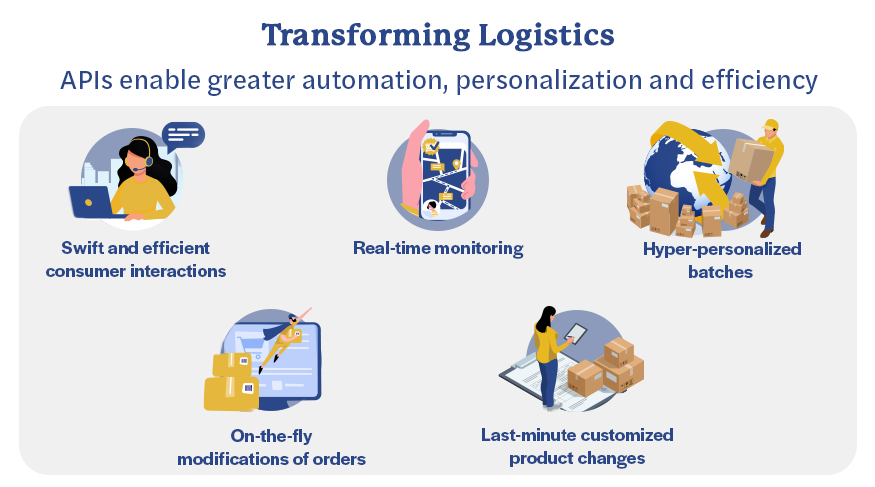Home » Industries » Transportation & Logistics » APIs Drive Product, Logistics Advances

Product manufacturers, aggregators, and shipping and logistics companies are increasingly using APIs or application programming interfaces — software intermediaries that allow multiple applications to “talk” to each other — to improve their delivery services. APIs can deliver leading-edge transportation and logistics solutions, with warp-speed consumer interactions and real-time monitoring (last mile) — while redefining assets and hyper-personalizing them for customers.
Transportation and logistics (T&L) businesses are turning to automation in a bid to contain costs and stay competitive. The business-to-consumer (B2C) market has exploded in the wake of the pandemic as people in lockdown have turned to the internet for their purchases. Both volumes and the profiles of goods shipped out have changed.
In response, logistics companies have fast-tracked their growth and development strategies, quickly expanding operations to seven days a week and making significant investments in e-commerce, people and assets to cope with the demand.
Now, one asset class — automated solutions — has emerged as a key component in the race to fill and deliver orders. Under this automated solutions model, containers may be stacked and unstacked, while trucks and other delivery systems may be operated with a minimum of human intervention. And that’s just part of the story.
One U.S. company has already deployed driverless trucks for its Los Angeles to Phoenix runs, scaling up from five trucks to 50 in 18 months, with plans to soon expand with a Dallas-to-Detroit route. APIs play a critical role in the success of this automated operating model.
API-enabled automation
Take a pharmaceuticals or medical devices company that wants to efficiently deliver products to its distributors. Until now, bulk batches of inventory were handed over to contractors at the docking bay, who would probably break it down by region and arrange for truck or other distribution to a regional distributor, who would then further break it down for delivery to individual retailers.
Each step of the journey involves multiple players, adding layers of expense and raising the risk of shrinkage, damage or other loss. In contrast, an API-enabled automated system may be able to directly deliver personalized batches to specific retailers, perhaps using a combination of drones and trucks.
Winners and losers
Atomic-level visibility during the manufacturing process has been available for some time, but customers will soon be able to post-order customized product changes — at least before a certain stage — and on-the-fly shipping order modifications. For example, changing the destination while an order is en route, perhaps when it’s at a FedEx Center.
Or say a restaurant orders a commercial freezer with a chrome finish, but before it’s shipped the customer decides that a red body and a metal-finished front would go better with the décor. They’re now no longer locked into an initial choice. But to participate in the warp-speed, hyper-personalized model of production and delivery, companies need to be able to sift through and understand huge amounts of data. And APIs are central to that.
A major focus right now involves building and enhancing APIs for logistics service providers and providing a developer portal for external parties to query the APIs, submit and track orders, and to obtain rates.
Just a few years ago, APIs and the hyper-personalization they enable were not even on the radar of transportation and logistics companies. But with the embrace of e-commerce — which was turbocharged by the social distancing requirements of COVID-19 — companies can’t compete effectively without an API strategy.
Key takeaways
- As competition heats up, transportation and logistics companies — along with manufacturers — have been pressured to speed up their operations.
- Besides faster, more flexible delivery, customers also want more order choice.
- Meeting these demands requires the ability to process mounds of data quickly and accurately. APIs can help companies do it.
Contact
Our experts can help you find the right solutions to meet your needs.
Get in touch
